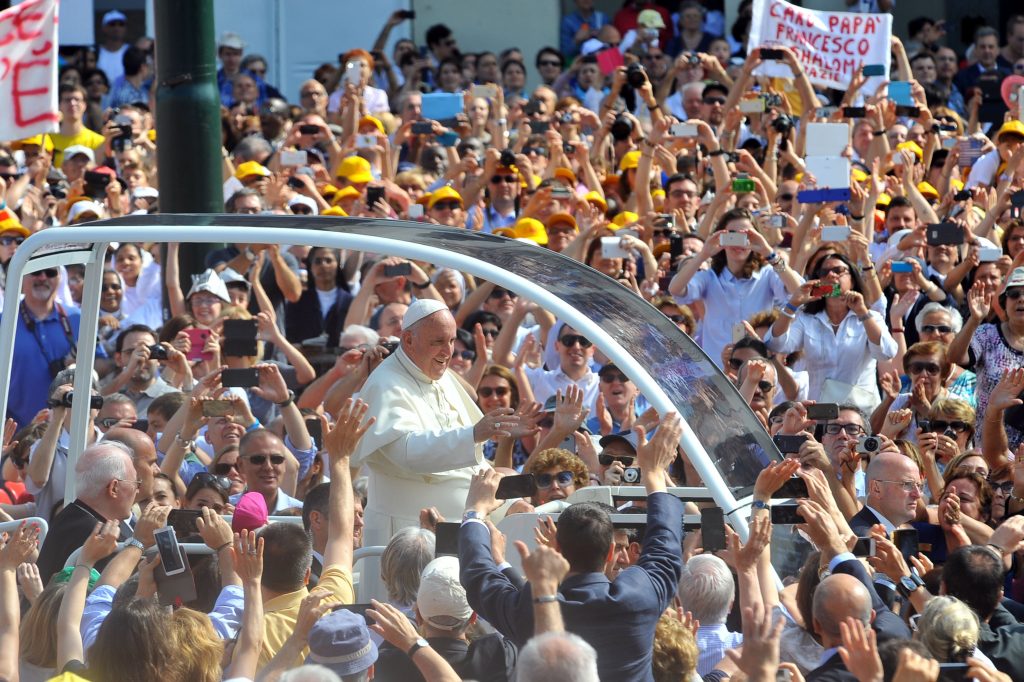While the world burns with a populist rage, where would the Church have been if Francis had not been elected pope in 2013?
It was a question asked of me by an astute Italian observer of both the Church and politics. His question was set against the backdrop of yet another political crisis in his country. Populist upheavals were paralyzing Italy, just as they had in England, Greece and the Philippines.
And, of course, the question was also set against the backdrop of Donald Trump’s surprising victory, a victory that has unsettled Europe and shaken the political Eight Ball, with the only immediate answer to any question being, “Reply hazy, try again later.”
There is something afoot, and it is frustrated, angry and merciless. The rich are getting inestimably richer, and not just the poor but also the middle class is increasingly on the outside of the gilded cage looking in. Their frustrations are often contradictory and even self-defeating — trade wars rarely benefit those who are struggling. Yet there is a reworking of Louis XV’s famous line: “Before I leave, the deluge. Bring it on.”
Which leads to the rather provocative question: Was Jorge Bergoglio the Catholic Church’s Donald Trump?
The question seems absurd at first. Bergoglio seems the opposite of the branding magnate who has created a marketing empire covered in gilt. The pope who described himself as “from the end of the world” was famous for his simple living, his hostility to the trappings of office and his passion for the poor living on the periphery of society. He is not calling immigrants “rapists,” and calls for tearing down walls, not building them.
Yet if one goes back to the four-minute talk he gave to his fellow cardinals before the 2013 conclave where he was elected, one hears an appeal that was a kind of Catholic populism. He called on the Church to “come out of herself” and go to the peripheries of society. He urged it to avoid “spiritual worldliness,” the “worst evil that can befall the Church.” Rather than a Vatican bureaucrat, he told the cardinals, the next pope “must be a man who, from the contemplation and adoration of Jesus Christ, helps the Church to go out to the existential peripheries.”
Not the rhetoric of Donald Trump, certainly, but a radical call that contained within it a critique of the Church’s status quo.
Although cardinals are not known for their radical nature, they chose a man who was not establishment. The cardinals — one hopes with the guidance of the Holy Spirit — elected someone who was calling for something new and different, a kind of pastoral populism. He was a man who felt — as many of them may have felt — that the Church was increasingly and dangerously removed from modern life and modern anxieties.
And while he might not have promised to “drain the swamp,” in fact he has been embarked on an effort to remake and recast the Vatican curia, seeking to make it more responsive and more aligned to his vision.
But where the Francis populist effect is most evident is his gift for the profound gesture: wading into crowds, paying his own hotel bill and calling people up at all hours. He leapfrogged over the bureaucracy to give long interviews that don’t sound packaged or churchy. He refused to live in the gilded cage of the papal apartments.
It turns out that the populist pope was in some ways a harbinger of a larger movement that is being born. In a media world that values spontaneity and genuineness, he showed how it was done.
And where would the Church be today if there had not been a Pope Francis? Would we still be talking endlessly about the clergy sexual abuse crisis, as we had been for the previous decade? Would the Church have been steadily more isolated as an institution that could only say “No” to the chaotic and rapidly moving cultural currents?
There are many people unhappy with Pope Francis. Very smart people, people who are driven to distraction by his studied vagueness on certain topics and by such sentences as “Who am I to judge?”
Yet without resolving all the various theological questions that concern his critics, I wonder what the Church’s last three years would have looked like if he had not arrived. I wonder what our Church today would look like if we had not proclaimed a Jubilee Year of Mercy? What even greater angers would have been unleashed if the pope had not traveled to Lampedusa and called attention to refugees drowning on Europe’s doorstep?
Pope Francis is not Trump. But at a volatile moment in modern society, a pope who has been more populist prophet than CEO may be positioning the Church to survive the deluge.

